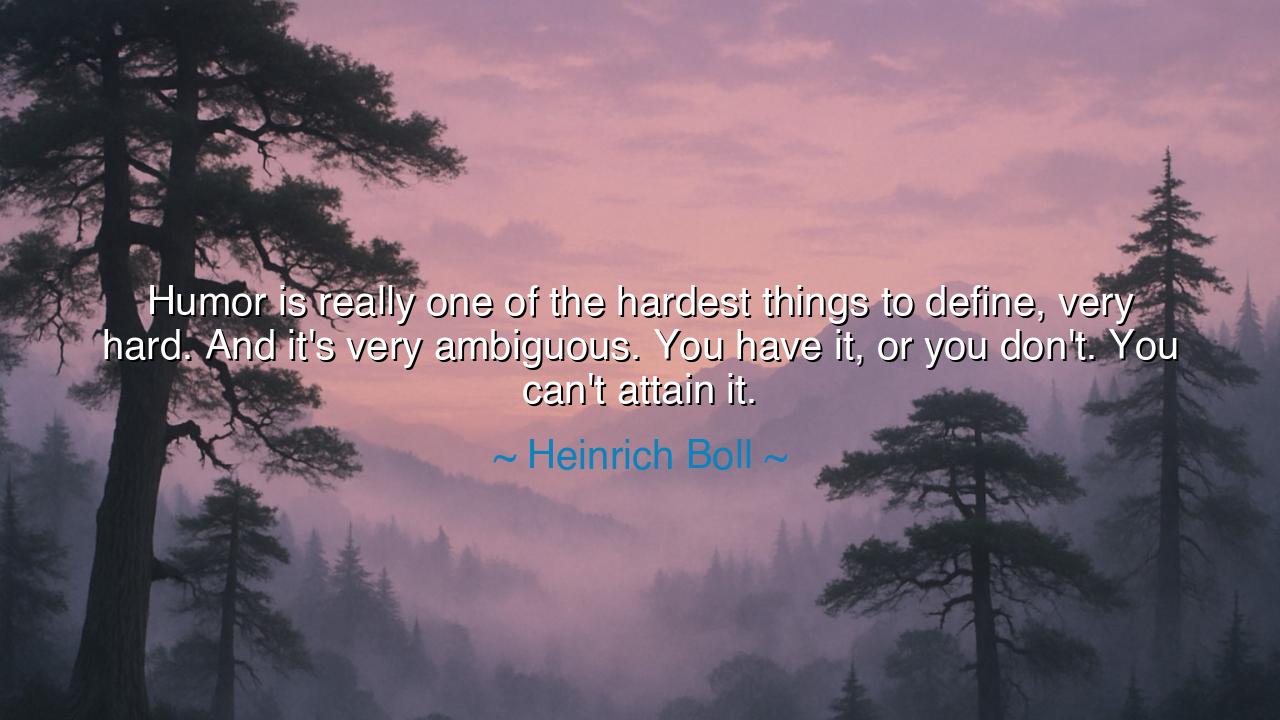
Humor is really one of the hardest things to define, very hard.
Humor is really one of the hardest things to define, very hard. And it's very ambiguous. You have it, or you don't. You can't attain it.






The words “Humor is really one of the hardest things to define, very hard. And it's very ambiguous. You have it, or you don't. You can't attain it” by Heinrich Böll speak like a philosopher’s lament — the admission of a truth both mysterious and eternal. They remind us that humor, though it may seem light as air, is a gift of the spirit, not a craft that can be forged by mere effort. It cannot be summoned by formulas or taught by the clever, for it springs from the deeper soil of sensitivity, wisdom, and pain. In these words, Böll — a Nobel laureate and chronicler of the human condition — reveals humor as a mirror of the soul, something born of life’s contradictions, not learned from its lessons.
To say that humor is hard to define is to say that it belongs to that rare class of truths which cannot be dissected without being destroyed. Like love, beauty, or grace, it withers under analysis. Humor is a paradox: both the lightest and the heaviest of human expressions. It can make men laugh in the midst of sorrow or tremble in the presence of truth. The ancients saw in laughter a divine force — a release of chaos, a reminder of mortality, a bridge between wisdom and folly. Böll, who lived through war, destruction, and moral collapse, understood that humor was not a trivial gift but a sacred one — the last rebellion of the human spirit against despair.
When Böll says, “You have it, or you don’t,” he speaks not of elitism, but of essence. Humor, in his view, is not imitation — it is intuition. It cannot be grafted onto the soul; it must spring from within it. The one who possesses humor sees the world differently — not with blindness, but with clarity that can bear pain without turning bitter. True humor arises when the heart has seen too much and chooses, still, to forgive. It is not learned through instruction but awakened through experience. In this, humor resembles compassion: both are born of suffering, both transform pain into light.
Consider the story of Abraham Lincoln, who, amidst the torment of the American Civil War, often turned to humor as a balm for the nation’s soul. When critics accused him of being too light-hearted for a time of bloodshed, Lincoln replied, “If I did not laugh, I should die.” His humor was not frivolity but courage cloaked in irony. It was his means of remaining human amid inhumanity — the same gift Böll describes, that undefinable grace that belongs to those who can see tragedy and yet not surrender to it. Such humor cannot be attained through training; it must be lived.
Ambiguity, Böll reminds us, lies at the heart of humor. The same jest that heals one heart may wound another. The same laughter that frees may also reveal. True humor walks the edge between joy and sorrow, empathy and distance. It is born of seeing the absurdity of life without losing faith in it. When humor is stripped of ambiguity, it becomes cruelty or mockery. But when it embraces ambiguity, it becomes wisdom — the laughter that recognizes both the beauty and the folly of being human.
In this way, Böll’s insight is both artistic and moral. He warns us against those who attempt to construct humor like a machine, who seek to wield it without heart. To such people, laughter is performance, not revelation. But real humor — like music or prayer — flows from something beyond the intellect. It arises when one has suffered enough to see the world clearly, but loved it enough to keep smiling. This is why the great comedians, philosophers, and prophets all share a strange kinship: they laugh not because life is easy, but because they have faced its darkness and refused to let it win.
So, my children of thought, learn from Heinrich Böll’s wisdom: do not chase humor as an art to be mastered. Instead, cultivate the soil from which it grows — awareness, empathy, humility, and depth. Laugh not to escape life, but to embrace it more completely. When you find humor within sorrow, when you can smile even as the world trembles, then you will have touched that sacred ambiguity that Böll describes. For humor, at its highest form, is not mockery — it is mercy. It is the soul’s reminder that even in imperfection, even in absurdity, we are still profoundly, beautifully alive.






AAdministratorAdministrator
Welcome, honored guests. Please leave a comment, we will respond soon